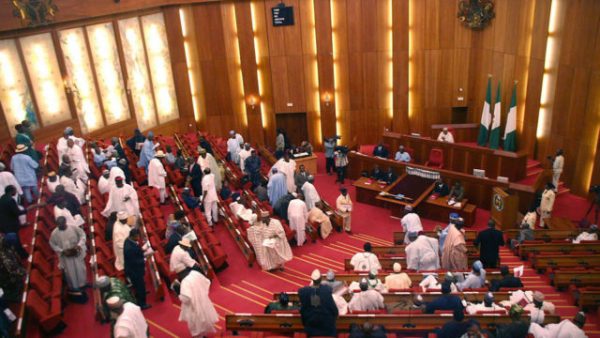Cargo Tracking Note: What Okonjo-Iweala Did Not Tell Nigerians

· How Onyema Okonjo was involved
Another dimension to the allegation of the yearly $6million proceed of the Cargo Tracking Note(CTN) charges diverted by some powerful aides of former President Goodluck Ebele Jonathan(GEJ) as stated by the former Minister of Finance , Dr Ngozi Okonjo-Iweala has unfolded.
A top official of the promoters of the suspended CTN project in Nigeria told MMS Plus that Okonjo-Iweala’s brother, Onyema Okonjo played a critical role as an intermediary in the re-introduction of the CTN under the GEJ era. He was said to have intermediated between her sister on one hand and the promoters of the CTN and the presidential aides on the other hand and was rewarded for his services.
The source who pleaded anonymity while exercising surprise at the former Minister’s outburst insinuating fraud, said that the scheme which operated for only 11 months at the first coming could not generate as much as $6million as alleged for the government’s share ratio in the project. He added that the truth of the profile can be established from the CTN account in First Bank Plc.
In her recently released book, “Fighting Corruption is Dangerous: The Story Behind the Headlines”, Okonjo-Iweala said she became a target of very powerful interests after she sought and got approval from Jonathan for the implementation of the ports reforms, which include the abolishing of a CTN, a regime which importers argued added costs to them for duplicate services.
Excerpts: “During my second month in office in September 2011, the issue of port congestion Okonjo-Iwealawas brought to the attention of the Economic Management team by members of Nigeria’s organised private sector, especially the Manufacturers Association of Nigeria (MAN) as a serious impediment to doing business. Importers were irate about a Cargo Tracking Note (CTN) regime which they argued added costs to them for duplicate services.
“They said that their cargos were already being tracked by the Nigerian Customs Service (NCS) from origin to destination, so then; there was no reason for the Nigerian Ports Authority (NPA) to collect this charge. Upon enquiry, we learned that charges totalled about $6 million a year, so this was consequential. I had never seen this money remitted to the treasury and, in fact, had not known of the existence of the CTN. We recommended that the CTN be abolished immediately.
“About six weeks into the implementation of the port reforms, in early December 2011, I received a message that a top-ranking presidential aide wanted me to stop by his office anytime I was in the Villa.”
The former Director of World Bank further disclosed that she was locked out of the Villa for refusing to obey the order given by the unnamed influential aide in Jonathan’s administration to restore the CTN with immediate effect.
. The ICTN was first introduced in Nigeria in 2009 under the management of Nigerian Ports Authority (NPA) and was suspended in 2011, following widespread criticisms by stakeholders in the maritime industry. Four years after its suspension, the Federal Government through the Nigerian Shippers’Council,NSC re-introduced it. However, this time NSC was able to secure the buy in of all the stakeholders but the implementation company ran into internal crisis which led to a major re-organization that halted their operation. Just when they were about to take off again, the new government of President Mohammadu Buhari intervened and since then, it has remained in limbo with court cases arising from counter accusations.
As at the time it was suspended for the second time under the NSC, MMS Plus gathered that it had generated $3million into the coffers of the Federal Government.
NSC has expressed readiness to reintroduce the policy on all imports into Nigeria. Speaking with MMS Plus, the Executive Secretary of NSC, Barr. Hassan Bello said that CTN would triple customs revenue profile in Nigeria, while urging the Nigeria Customs Service(NCS) to re-prioritize its function to trade facilitation and eschew the seeming revenue target rivalry among the various customs commands.
. The CTN also known as Advance Cargo Declaration System (ACD) is a global initiative to monitor and verify cargo on transit from port of origin to port of destination. It would also, enhance the security functions of government. African countries such as Angola, Benin Republic, Central African Republic, Togo and Cote D’Ivoire have introduced CTN to track cargoes coming into their respective territories and the implementation of the CTN would bring an end to the increasing incidence of under declaration of cargoes and concealments, which had denied the Federal Government of huge revenues.
It was introduced as a means of improving the security around marine shipments. International logistics companies involved in overseas shipping of any kind, whether for personal or business removals are required to provide or obtain CTN for all cargo traveling by sea. It is a way of verifying the content of every cargo and then tracking them between ports..
According to Bello, the objective of CTN is to improve the security and safety of supply chain and help us see the profile of products we are bringing in through the sea ports.
On the benefits, he explained that CTN will enhance the security and safety for the shippers and assist relevant agencies of government on risks mitigation on imports, it will hasten vessel reception and cargo clearance procedures due to the advanced information about the inbound cargo which will be available to the customs, terminal operators and other agencies involved in the cargo clearance process..
While it will aid better economic governance due to transparency and automated system, Bello noted that it is a suitable tool for the collection of information on applied freight rates.
The decision to create CTN in West and Central Africa sub-region was first made in a workshop organized by the Union of African Shippers’ Councils(UASC) in collaboration with the United Nations Conference on Trade and Development (UNCTAD) in February, 2002.
The scheme was later embraced by African countries from 2005, even though in most of the countries, ICTN certificates became effective between 2014 in Gabon and 2017 in Tanzania. As at today, eighteen African countries have implemented ICTN. While it mandatory for the International Ship and Port Security(ISPS) code compliance as required by the International Maritime Organization(IMO), countries that have implemented it include, Benin Republic, Angola, Cameroun, Mali, Niger, Senegal, Togo.







